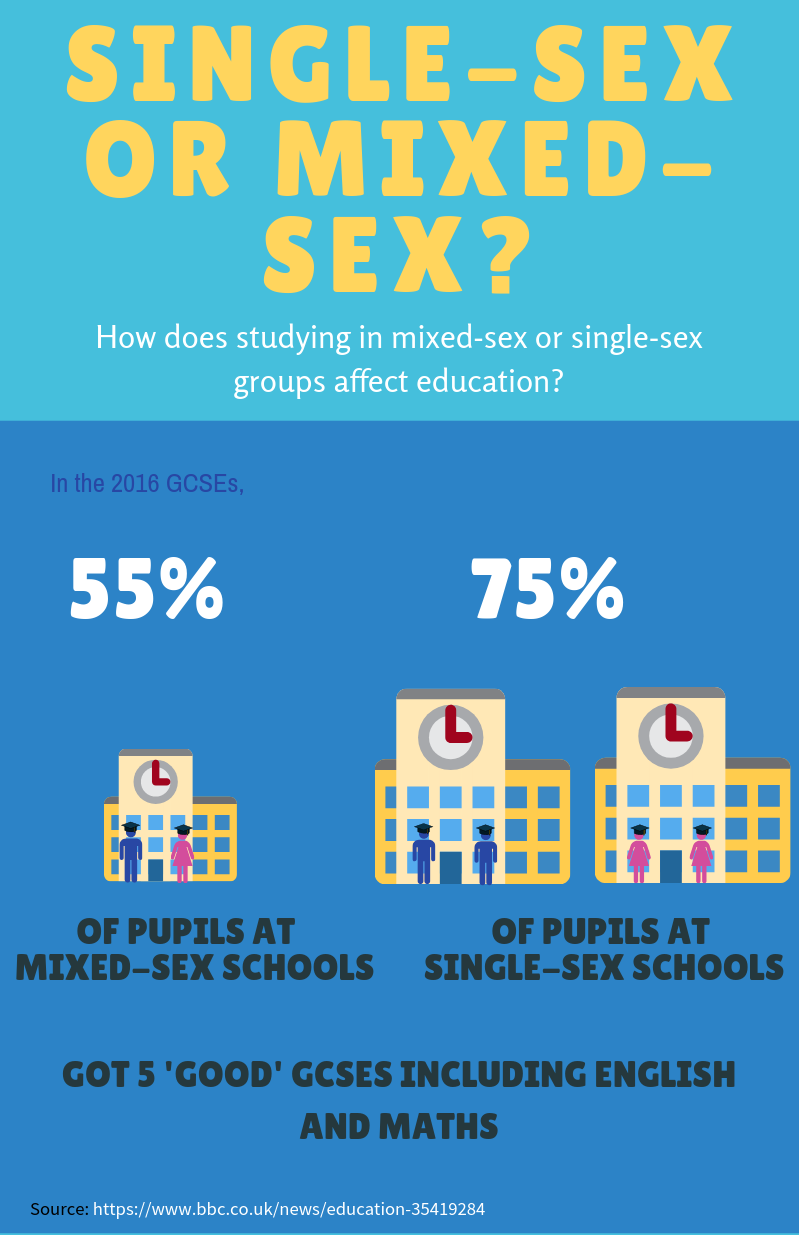The following infographics show that things such as your race, gender or birth date can potentially impact your education -- how you perform and how you’re treated. That said, it's really important to be aware that these statistics come from research and show general trends within those studies -- they don’t necessarily suggest anything about an individual of any particular gender, race, etc. and their potential.
Gender
Though in theory education should be equally available to all genders, in many countries the reality is not always so simple. Unconscious bias means that teachers may encourage ‘feminine’ or ‘masculine’ behaviour without meaning to. For example, they might reward boys for giving long, confident answers and girls for staying quiet (Sadker and Zittleman, 2009). Boys and girls don’t always perform the same in exams either…

What do you think? Can the results of these studies represent society as a whole?
Is there a big enough difference in the exam results between boys and girls to be significant?
And if there is a significant difference, is this because education is unfair or due to something else…?
Single-sex and co-educational schools
Many people debate whether students benefit from studying at a single-sex school (an all-girls or all-boys school) or a co-educational one, where boys and girls learn together.

At first glance, it seems pretty straightforward -- pupils at single-sex schools receive more 'good' passes at GCSE. But correlation (two factors being associated with each other) is not the same as causation (one factor causing another). One important thing to remember is that single-sex schools are more likely to be private schools, which could be offering pupils other advantages like more resources and smaller class sizes. Read more.
What do you think? Does attending a single-sex or co-educational school really affect your grades?
Teachers’ perceptions of students
As with gender, education should be equal to all racial groups. But some studies suggest that teachers view and treat students differently -- often without meaning to -- because of their race. Research by Rosenthal and Jacobson (1968) and others also shows that the way teachers view students -- and especially how high their expectations are of them -- can affect students’ progress…

What do you think? Can school be fair if teachers’ views of a student can affect that student’s educational progress?
Find out more by reading about ‘The Pygmalion Effect and the Golem Effect’, also in this Big Question!
Students’ perceptions of teachers
It’s not always fair for teachers, either. Research has shown that students are likely to consider male teachers to be better at their jobs than female teachers. And it’s not just about gender. Students may more closely relate to teachers who are of the same racial identity as themselvese, and therefore rate them higher too…

What do you think? Is there any way to prevent students and teachers from viewing each other differently when the school community is so diverse?
Having a teacher they identify with seems to be important to students - but what happens, for example, if there aren’t enough teachers from minority racial groups?
Birth date
Different countries have different rules about at what age you must start school — but no matter the rule, there are always those who are the oldest and those who are the youngest in a class. Many people think that it’s harder for the youngest to succeed — whether this is succeeding academically, developing self-confidence or becoming a professional sportsperson. For example, in 2009, people who were born in only three months of the year (September, November and December) — so making up around 25% of the population — made up over 50% of those who got into professional youth football academies (source). Some parents say that the youngest and the oldest should sit different exams — or they try to time having a child so that their child will be one of the oldest…

What do you think? How much does birth date really matter?
Is there any way to make it fairer for those who are the youngest?
Is school | the best place to learn?
Vote now-
Read More
- Is school the best place to learn? University courses to take this further...
- Dig deeper with a student...
- What goes on in teachers’ brains as they help students to learn
- 5 interesting facts about school around the world
- The Pygmalion Effect and the Golem Effect -- how do teachers’ expectations affect their students?
- Is school always fair?
-
Watch More